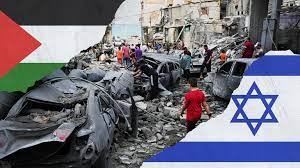The recent outbreak of violence between Hamas and Israel has raised alarms around the world. Starting with a surprise attack by Hamas, the situation has quickly evolved into a complex web of regional and international implications. This article seeks to break down the various aspects and repercussions of this conflict. As the Hamas-Israel conflict continues to evolve, the need for introspection, diplomacy, and collaborative action becomes even more paramount. While wars may have momentary victors, in the long run, they leave scars that take generations to heal. The international community’s responsibility is not just to ensure an immediate ceasefire but also to lay the foundation for a sustainable peace in the region.
- The Outbreak of the Conflict
The war commenced on October 7, 2023, when Hamas unexpectedly attacked Israel, sending thousands of rockets and subsequently prompting Israel to retaliate through airstrikes and deployment of ground forces.
- Global Response and Diplomatic Stances
Numerous countries and global institutions have voiced their opinions regarding the conflict. While the US showed its support for Israel’s right to self-defense, it also extended humanitarian assistance to Gaza. Despite international calls for resolution, the UN Security Council faced opposition from China and Russia, rendering their efforts ineffective.
- Broader Regional Implications
There’s growing apprehension about the conflict turning into a much larger confrontation. The war is seen by some as a manifestation of the deeper rivalry between Iran and Saudi Arabia, two regional powers with opposing views on the Palestinian question. With Iran backing Hamas and Saudi Arabia in dialogue with the US about Israel, the tensions are palpable.
- Potential Trigger for a Larger Conflict
The current conflict has potential consequences beyond the immediate region. Experts warn of the possibility of this escalating into a conflict involving Israel and other Arab states, notably Iran. The involvement of global powers such as the US, NATO, China, and Russia might be inevitable if things take a turn for the worse.
- Counterarguments Against a Global War
Despite the looming fears, several arguments suggest that the situation might not spiral into a global war:
Deterrence Through Nuclear Power: The existence of nuclear weapons might deter major players from risking a conflict that could lead to mutual annihilation.
Diplomatic Interventions: The global community can exert diplomatic pressure to bring about de-escalation and potential peace talks.
Power of Public Opinion and Civil Society: People around the world, through civil movements and public opinion, can voice against violence and champion humanitarian causes.
Economic and Environmental Considerations: The costs of war, both economic and environmental, can act as a significant deterrent.
- The Humanitarian Aspect
One cannot overlook the grave humanitarian crisis unfolding as a direct consequence of this conflict. Both sides have seen a significant loss of life, with innocent civilians, including women and children, being caught in the crossfire. Critical infrastructure like hospitals, schools, and shelters have been damaged, limiting access to essential services for the affected population.
- Media’s Role in Shaping Perceptions
The role of both mainstream and social media has been pivotal during this conflict. While it provides an essential platform for information dissemination, it has also been accused of bias, misinformation, and sometimes amplifying hate. The narratives presented shape public opinion, making it crucial for media outlets to maintain objectivity and offer balanced views.
- Economic Repercussions for the Region
The Middle East, as a vital hub for oil and trade, will inevitably face economic repercussions due to the conflict. Rising oil prices, disruptions in trade routes, and declining investor confidence could have a cascading effect on the global economy. Countries dependent on the region for energy resources might need to recalibrate their strategies.
- Role of Regional Players in Mediation
Countries like Egypt, Qatar, and Turkey have historically played roles in mediating between Hamas and Israel. Their strategic positions and relationships with the parties involved make them crucial actors in the current scenario. Their diplomatic efforts, alongside international interventions, can pave the way for a potential ceasefire and dialogue.
- Looking Forward: Pathways to Peace
Finding a lasting solution to the Palestinian-Israeli conflict has been a challenge for decades. However, given the current situation’s severity, there is a renewed emphasis on revisiting peace talks. The two-state solution, which proposes separate Israeli and Palestinian states coexisting peacefully, remains a widely discussed proposal. Engaging in constructive dialogue, rebuilding trust, and addressing core issues like borders, refugees, and Jerusalem’s status are vital steps in achieving lasting peace.
(India CSR)







